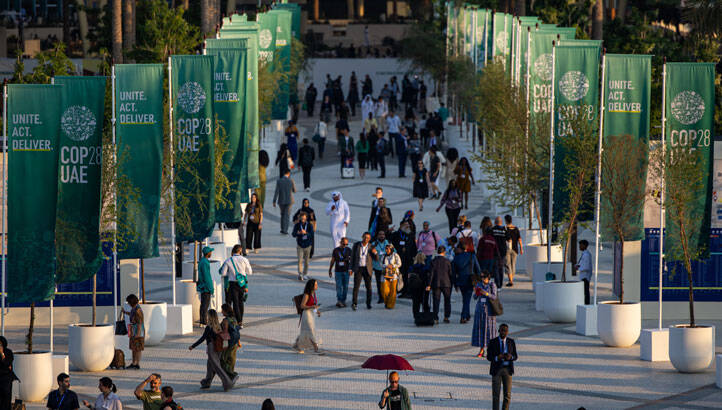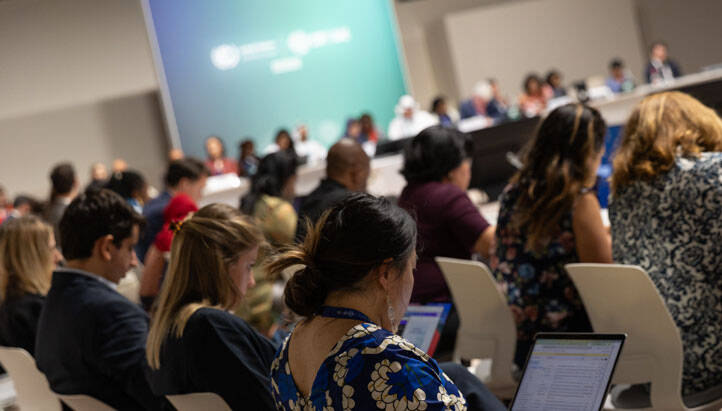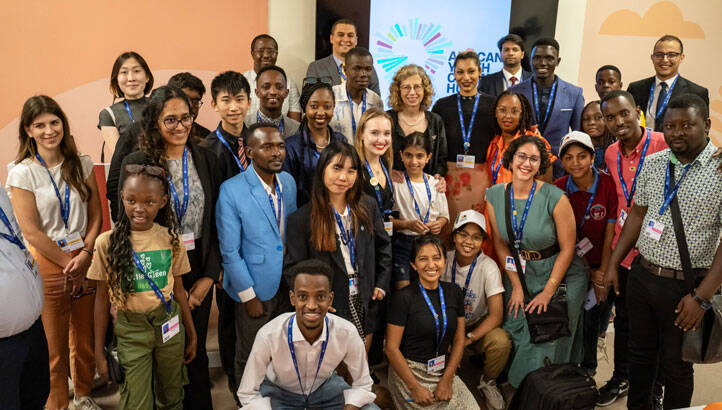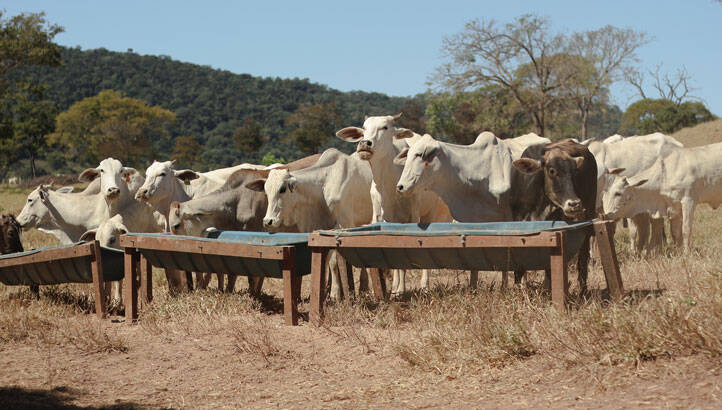This premium content is exclusive to edie Members.
To find out more about edie Membership, please click below.
If you are an existing member, login here

Images clockwise from top left: Kiara Worth for UNFCCC / Luke Nicholls / Inger Anderson for UNEP / IRENA
This is the first COP with a Pavilion dedicated to children and youth, in recognition of the impetus to build a liveable future for future generations and of the work that young leaders are already undertaking in climate diplomacy and in the green economy.
Youth on the frontlines of the climate crisis made themselves heard at Expo City in Dubai by staging several protests focused on adaptation finance and a fossil fuel phase-out.
Meanwhile, UN bodies published major recommendations on food systems ahead of the agriculture-themed day on Sunday (10 December) and the COP28 Presidency has continued to be urged to rally negotiators in support of a strong official agreement.
To help you recap all the action, this article rounds up six of the headline happenings from 8 December at COP28.
This edition also includes a couple of key talking points from yesterday, Thursday 7 December, which was the COP’s one and only official rest day.
You can find all of our COP28 coverage here.
800+ business and climate leaders urge COP28 team to keep 1.5C alive

Image: UNFCCC Flickr/ Christopher Pike
A group of more than 800 business leaders and renowned climate specialists including Paul Polman and Christiana Figueres have sent a joint letter to the COP28 Presidency, warning that the negotiating process risks being weakened by those profiting from activities that fuel the climate crisis.
The key message of the open letter, convened through the B Team, is that nothing less than an unambiguous commitment to phase out fossil fuels will be sufficient to keep the Paris Agreement’s 1.5C trajectory in reach. The phase-out should be “orderly and just”, the letter states.
The letter also calls on world leaders to better embed nature considerations into climate COPs, pushing for an agreement this COP to halt and reverse deforestation this decade.
Signatories include more than 300 C-suite executives at businesses like Danone, Heineken, Natura & Co, Avon, A.P. Moller-Maersk and Virgin Group.
Dozens of mayors and philanthropists are also on the list, as are more than 240 NGOs and 70 climate scientists. Big names include Jacinda Ahern, Mary Robinson, Lord Adair Turner and Sadiq Khan.
The call to action is necessary given the sizeable presence of businesses on the ground in Dubai with interests in delaying and blocking progressive climate policy. An InfluenceMap assessment out today confirmed that only one in ten corporates present have engaged in lobbying aligned with 1.5C. There are some vocal, extremely misaligned companies with delegations exceeding ten people present, including Chevron and ExxonMobil.
Reports emerge that talks risk stalling

Image: UNFCCC Flickr / Kiara Worth
The B Team letter comes at an opportune moment in the COP28 talks, which have now entered their second week following the summit’s one and only rest day. Following the flurry of new declarations launched by the Presidency team in the first few days, on topics including renewables and health, those leading the negotiations are being urged to avoid a “vacuum” of ambition and action as they continue to hammer out the final agreement texts.
UN climate chief Simon Stiell told a press conference today that while “compromises” on the texts “will be essential”, this must be on the delivery specifics – not the level of ambition. He noted that there are still “low, middle and high-ambition options on many issues” on the table, including fossil fuels.
NGO CARE’s global policy lead for climate justice, Sven Hamerling, said: “After a positive start, the lack of progress at COP28 is concerning. The operationalisation of the Loss and Damage Fund was a landmark day for climate justice but the amount of funding pledged so far can only be regarded as a very first step. Negotiators are not close to an agreement on many of the most pressing issues, from fossil fuel phase-out to a strong support package for poorer countries to address the climate crisis.”
COP28 President Dr Sultan Al Jaber has stated that he will “push for the highest possible ambition to ever come out of a COP”. But confidence in his leadership has been dented time and again by his responsibilities as chief executive of the UAE’s state-owned energy firm ADNOC.
Al Jaber is aiming to get all the negotiations wrapped up in an “orderly fashion” by 11am in Dubai on 12 December, which seems unlikely given the trend towards COPs running more and more past time as the years go on. A key step taken today towards speeding and easing the process was the confirmation of four pairings of Ministers to lead the remainder of the talks.
Global Youth Stocktake of UNFCCC Processes unveiled

Image: Inger Andersen, UNEP
The Youth Stocktake is the centrepiece youth advocacy document for COP28. More than 750,000 young people from 160 nations have contributed to this workstream, which was published to coincide with today’s themes on the Presidency agenda.
COP28 Children and Youth Pavillion Coordinator Mashkur Isa summarised: “The launch of the Youth Stocktake Event is monumental. It provides the first-ever comprehensive analysis of youth inclusion in international climate policy processes, including key milestones, gaps and challenges youth face in engagement as well as offering ways forward. It is crucial to continually take stock to measure progress and improve on strategies for youth inclusion and participation.”
The Stocktake notes that there have been Youth Declarations at COPs since COP6, but that Youth were not granted official status in the COP process until COP15. It reflects on progress to date and the remaining barriers to youth participation in COPs in a manner that goes beyond sidelining and tokenising.
The document reads: “There is a lot of progress that is still to be made in the pursuit of ensuring the voices of children and youth are included in international climate negotiations. The youth climate activists of today continue to face a multitude of challenges that restrict their participation in climate negotiations, including visa-related restrictions, logistical and practical hurdles around accreditation and accommodation as well as various other socio-economic, gender-based and regional discriminations. These challenges prevent many young people from being able to access climate negotiation spaces.”
UN outlines sweeping recommendations on livestock emissions

Stock image
There was disappointment earlier this week when initial versions of negotiated texts failed to mention food and land-use. Discontent was amplified due to the Presidency’s strong focus on these topics ahead of the COP and due to its decision to dedicate two days in the thematic agenda to nature and land use, then agriculture and water.
Two UN bodies have today unveiled key reports making recommendations on shifting protein production and consumption patterns towards alternatives with a lower greenhouse gas (GHG)footprint.
The UN Food and Agriculture Organization’s (FAO) report focuses on livestock, which accounts for around 12% of all man-made GHG emissions each year. This report warns that demand for animal products is likely to grow by one-fifth by 2050, against a 2020 baseline, without context-based and urgent intervention from policymakers. It recommends that wealthy nations take action to change diets towards less frequent meat and dairy consumption, and that all markets take concerted action to change animal feeds and breeds to reduce emissions.
This report comes ahead of the FAO’s publication of the world’s first science-based pathway to 1.5C for the global food system, expected on Sunday (10 December).
The UN Environment Programme (UNEP), meanwhile, has outlined recommendations for a three-pronged approach to stop demand for meat from growing by up to 50% by 2050. This increase, it is warning, could undermine international agreements on climate and biodiversity. It urges governments to chart robust plans for scaling novel plant-based meats, cultivated meats grown from animal cells, and protein-rich ingredients created through fermentation.
UNEP’s executive director Inger Andersen said these alternatives, scaled in tandem, can “offer a broader spectrum of consumer choices” wile “lessening the pressures on agricultural land and reducing emissions, thereby helping us address the triple planetary crises” of climate, biodiversity and pollution and waste.
Utilities serving 250,000+ people back new joint action plan on renewables
Early on at COP28, a new international pledge was launched under which more than 110 nations committed to treble the world’s renewable energy generation capacity by 2030. That list has since grown to exceed 130 countries, but questions remain about how national governments will work to create the enabling environment in terms of grid infrastructure, investments, skilled workers and supply chains.
The private sector, meanwhile, has signalled its intention to play its part. More than 25 major global utilities and power companies, serving a customer base of 250 million, have joined forces to advance renewables-ready grids and boost clean energy deployment this decade, through a new Utilities for Net-Zero Alliance (UNEZA).
UNEZA plans to devise a strategy to alleviate major energy transition challenges, including capital mobilisation, mitigating supply chain risks, fostering talent development and aiding policy and regulatory support. It will develop this strategy following public-private consultations, and members will collaborate to turn its vision into reality.
The UNEZA secretariat will be headed by the IRENA and the Alliance itself is led by the UAE’s Abu Dhabi National Energy Company (TAQA). Initial members include EDF, Enel, Engie, Iberdrola, National Grid, Octopus Energy, RWE and SSE.
2030 Shipping Pact For People and Nature takes shape

Stock image
A new ‘2030 Shipping Pact for People and Nature’ (SPPaN) has emerged as a cross-cutting initiative to address the short and long-term impacts of shipping on ocean health and biodiversity.
The initiative is based on the report, ‘Navigating the Future: Bridging Shipping, Biodiversity, and Decarbonisation,’ which underscores the need for a coordinated approach in shipping practices, recommending the formulation of the 2030 SPPaN.
It bears noting that the pact, presently, stands as an idea without current member affiliations.
This pact outlines concrete measures to assess, reduce and avoid negative impacts on marine biodiversity and climate. The proposed measures include phasing out scrubber washwater discharges, enhancing ballast water treatment systems, implementing an ‘ECA Everywhere’ policy to reduce air pollutants and quadrupling the number of Particularly Sensitive Sea Areas.
Further, the pact aims for a yearly 8% efficiency improvement in the Carbon Intensity Target, alongside targets for reducing underwater noise, fleet average speed and whale strike mortalities. It also proposes the global ban on Heavy Fuel Oil (HFO) by 2030 to mitigate spill risks.
The shipping industry presently contributes to 3% of global CO2e emissions, a figure that could escalate to 17.5% without transformative action.
The urgency to decarbonise the shipping sector was emphasised at COP26 as well, where the UK and more than a dozen other nations signed the ‘Clydebank Declaration’ to forge zero-emission shipping routes between ports.
This pact targets six corridors by the mid-2020s, focusing initially on shorter routes and expanding to encompass numerous long-haul routes by 2030.
Access all of edie’s COP28 content here.



Please login or Register to leave a comment.